
KOJI is ….
First of all… Why is Koji so good for you?
Because Koji…
- Aids digestion and absorption.
- Provides probiotics & prebiotics for good gut health.
- Is simple, and easy to cook with, leaving more time for yourself.
- Is a Great meat(protein) tenderizer and enhances flavour.
- Makes you feel like a good chef !
What is Koji ?
Even if you are not familiar with Japanese food, you may have heard of ingredients like Miso, Soy Sauce, Sake, and Mirin.
These Japanese seasoning staples can easily be found near your Asian store or Asian aisle, and each contains one common key ingredient:
That key ingredient is KOJI.
Koji is a type of fungus (Aspergillus oryzae*) and usually inoculated with some type of grain such as rice, soy beans and barley. It is essential for the fermentation process used to make those staples.
These staple ingredients have been around for over 400 years in Japan, and are commonly used in everyday cooking from miso soup, teriyaki sauce, to tempura sauce (you name it! )
Koji is a signature of Japanese food culture and it is a comforting recognizable style of flavor found in many kitchens across the world.
What does Koji do?
The most fascinating thing about Koji is, it does not add flavour.
Rather, it enhances the deeper flavor components of whatever it is added to.
It sounds like too good to be true. but it is true, plus there are ton of health benefits too!
The Magic of Koji is its ability to give us delicious foods with less effort and time -Koji Alchemy-
How does Koji work?
Magically, Koji has an abundance of enzymes !!
Koji = Enzymes
All staples are fermented by Koji. Koji is the starter for fermenting these staples, just like yeast for bread, and malt for beer.
Over 100 types of enzymes are produced during the process of Koji making and those two major types of enzymes are the key to ferment.
- Proteases : break protein into amino acids which creates umami
- Amylases : break starch into simple sugar
Those enzymes break down the large molecules into smaller pieces and produce sweetness and lots of umami*.
*Aspergillus oryzae : it’s a member of Aspergillus family of mould and is found all over the world. Other Aspergillus moulds produce toxins, but the domesticated Aspergillus oryze does not.
Using mould to ferment food isn’t unusual, like other fermented items such as cheese and tempeh.
*Umami is the core fifth taste (alongside the sweet, sour, bitter, and salty taste buds)
Typical umami packed foods are aged cheese, mushrooms, kelp, tomatoes, salmon, cured meat and more.



